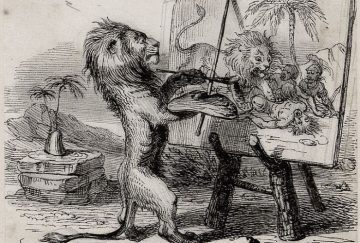Marta Figlerowicz in the Boston Review:
 Humans always defeat lions in paintings because there are no lion painters. With this lesson, the griot gets up to leave, as Dani Kouyaté’s Keïta! (1995) comes to an end. The film is set in late twentieth-century Burkina Faso. The aphorism culminates a series of lessons that a folk storyteller imparts to an urban youth, all cautioning that traditional knowledge must be preserved in order to survive the country’s rapid modernization. City dwellers should learn French, but also Mandinka; they should know the oral epic Sundjata as well as they know capitalism.
Humans always defeat lions in paintings because there are no lion painters. With this lesson, the griot gets up to leave, as Dani Kouyaté’s Keïta! (1995) comes to an end. The film is set in late twentieth-century Burkina Faso. The aphorism culminates a series of lessons that a folk storyteller imparts to an urban youth, all cautioning that traditional knowledge must be preserved in order to survive the country’s rapid modernization. City dwellers should learn French, but also Mandinka; they should know the oral epic Sundjata as well as they know capitalism.
But the dichotomy is not so easy to draw. The griot delivers the moral in the local language, yet most viewers would recognize it as not unique to West Africa. Versions appear in Aesop and, more significantly in this context, in the fables of La Fontaine. The lesson of cultural difference becomes one of transcultural porosity. Imparting a lesson about otherness, the anecdote refuses to reveal its own nativity; instead it attests to its own capacity to inhabit multiple cultural worlds.
Few scholars devote their careers to following such stories, and those who do tend to be philologists rather than philosophers. Hans Blumenberg, who died in 1996—he might just have seen Keïta!—was the rare philosopher fascinated by such traveling anecdotes. One of his monographs discusses stories of absentminded philosophers who fall down wells; another volume studies depictions of shipwrecks and people watching them.
More here.
